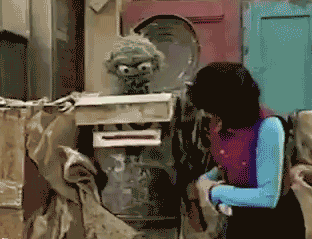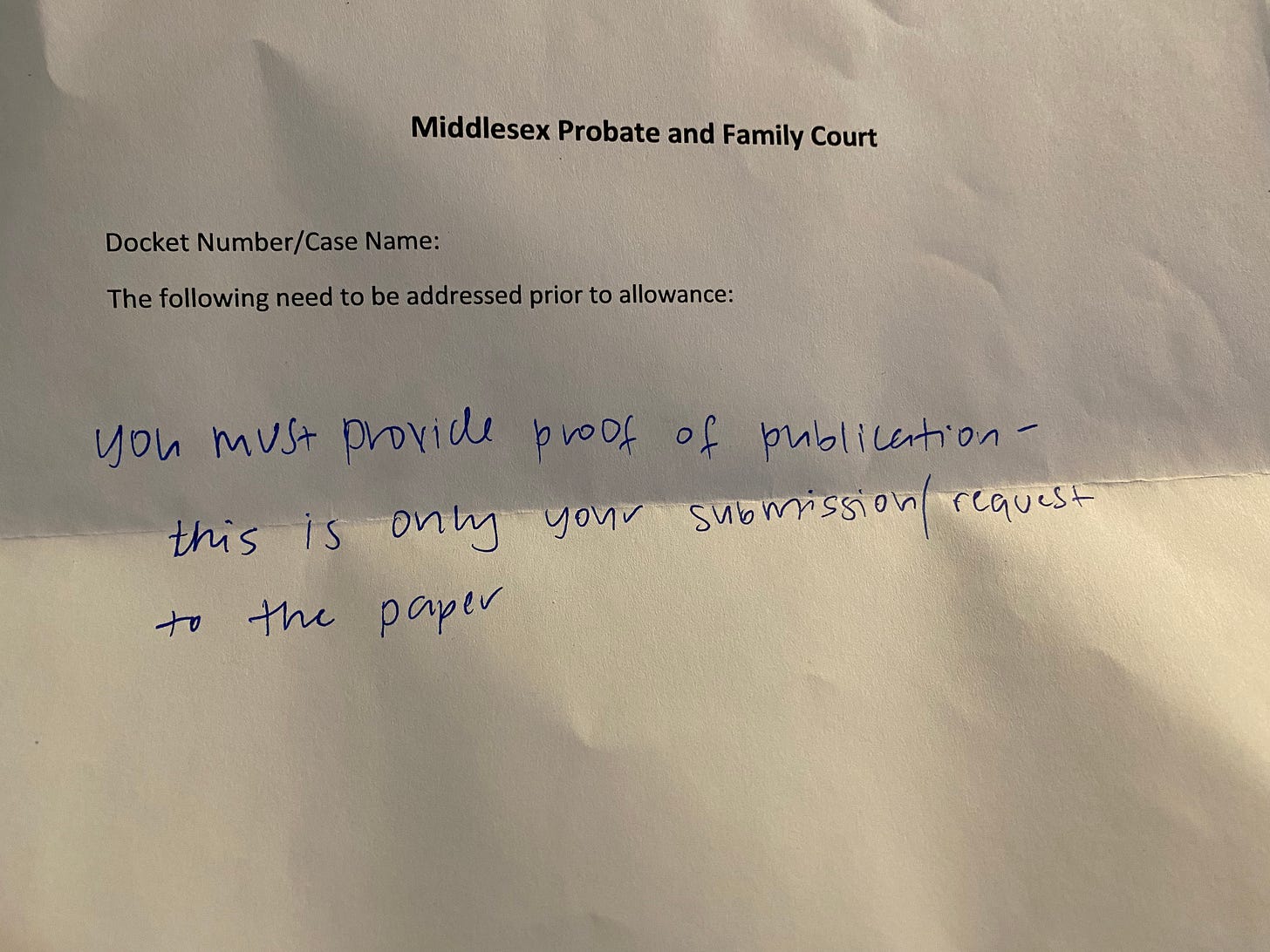Changing your name is no joke
In which I examine my various axes of privilege in the face of intense government bureaucracy

The more astute of you might have noticed my name change here, or rather, name shedding. At long last, I have shuffled off my marital coil and returned to my original family name. Though in truth, it was a name change, because it turns out the office flat-out lied to me way back when they told me I could keep my maiden name as a second middle name. So I’ve been using my name illegally all this time I guess?
Read on for more of the absolute shitgoblintry the courts put me through in the course of this ostensibly simple process of getting to be called what I want to be called, as a middle-aged cis white lady.
But before that, because here’s the point:
Why is changing your name so hard, and how frigging harrowing must this be for trans people?
I have trans friends, I see trans clients, and I read trans people’s stories. So I have some sense, at least from the outside and at a near distance, of how rough name change stuff can be. Deadnaming can be highly triggering for some people. For others, it is at least dysphoria-provoking. And having to see a name that no longer feels like it refers to you on countless bills, official documents and IDs sounds intensely alienating. Hell, even I got sick of seeing my leftover marital name on things all these years, and it took me close to ten of them to decide to get rid of it.
And I just had the first-hand opportunity to find out why it took so long.
A little history of me and names
I never was much into my name growing up. My first name was weird (nobody could pronounce it right (it’s just Pamela except with a K, it’s not that hard!), and children liked to call me Camel, or sing the “Camay all over” song (I was called “Kammy” in those days, too, which…I abandoned as soon as I had the chance. But tellingly, that also took a while).
“Hutzley” was another matter. I always thought it sounded awkward and ugly, kind of like a sneeze. My grandfather had a hilarious bowling trophy that had been misprinted “Nutzley,” and that was also kind of apt. I was clumsy as a kid and couldn’t believe nobody was cruelly clever enough to come up with “Klutzley,” although I managed to berate myself with it. Nothing about my name had an elegant feel to it, though it was clear to me through my mother’s side of the family that ‘class’ and ‘elegance’ were very important, and that it was my father’s side of the family that lacked those things.
So by the time I got married at 30, it wasn’t a huge leap for me to change my name.
Marriage is a huge set of unearned privileges
This is not an essay about the massive government conspiracy that is legal marriage, nor about how what had been a radical queer movement became focused almost entirely on obtaining marriage rights, nor about all the ways those rights and privileges saved me when my marriage ended, though I might write about that someday.
No, this is about getting to change your name for free.
When you get married, you get a free name change if you want it. Part of the marriage license, which IIRC costs like $50. If one or both of you would like to change your name, you can do it right then. Given I wasn’t exactly, er, married to my own last name at the time, since my relationship with my father was fraught and that with his side of the family had been non-existent since I was a child, I figured I’d take the opportunity to have a new one.
My almost-husband at the time and I talked about taking a third, new family name together, but in the end he was too much of a coward, and I took the feminized version of his name instead, since in his mother tongue, names have gender. It was a compromise way for us both to have a similar name, but for mine to still be in some way unique, at least in English.
Over the course our marriage I did a lot of things in the community under my married name, which after all was subtly different from his and went very nicely with my first name. (“Kamela Dolinova,” it has music to it, no?) I came to think of myself that way, and played various theatrical roles and wrote under that name.
Fast forward to 2013, the year my marriage fell spectacularly apart for a lot of reasons I again won’t go into here but might someday; suffice to say that his cowardice was only one of several unfortunate qualities. The end was long and drawn out, and amid the harrowingness of it I didn’t really have it in me to include the other free name change the state offers: upon divorce. I can’t really explain it: all logic says that I should have abandoned this faux-Russianness and everything it represents along with my marriage. But somehow I couldn’t bring myself to, just then. At the time, it felt like giving it up would be one more thing he took from me. With the extra ‘a’ on the end, that name was mine, fair and square.
But this one was mine, too
That very Christmas, though, I had an extraordinary experience. My aunt, my father’s sister, whom I hadn’t seen since I was maybe seven, had found me on Facebook late in 2011. Two years later, I found myself visiting California for Christmas with a dear friend who insisted I come with her after my husband left at the end of October. My aunt lived not far away (in Gilroy, America’s garlic capital, incidentally), and I decided to go see her and my uncle.
I’ll never forget showing up to their door and my German uncle, whose dark beard and glasses I always remembered, looked my six-foot self briefly up and down and said, “Well, you are definitely a Hutzley!”
That day was the start of a beautiful reconnection to that side of my family: I’ve since spent some Christmases and some other lovely occasions with my cousins on that side and their families, and when my dad died in 2016, my aunt and uncle showed up hardcore to help out.
By then my divorce was at last finalized, but somehow I hadn’t fully absorbed being “definitely a Hutzley.” Still, I started to get annoyed whenever someone would ask if I was Russian, or when I had to say or spell my name aloud.
Becoming a Hutzley while also becoming a Canadian?
Now that I’m on the cusp of moving to Canada, and looking at renewing my passport early in case of 2024 shenanigans, I finally decided: it’s time. The married name started to feel more and more like a misnomer, a wedding ring worn well after a separation, a piece of an old life I was for some reason unwilling to let go. I was ready. There’s a piece, too, about having mourned and lived in a kind of frozenness over the past ten years; I wasn’t fully present in my relationships, in my body, in my home. It’s been a long, half-lit time.
When I met my current partner, early in 2021 and deep in the pandemic, everything started moving again. Things became sharper, clearer, made more and more sense and gave me more and more joy the more I narrowed and deepened my focus. Meanwhile, my married last name became less and less fitting. My partner started to say my full name as Kamela Hutzley, when he was being very cute and serious at me. I…started to love it, in a way I never loved it growing up. It felt like it was mine. And it was time to take it back.

What the hell is with the probate court
So I embarked. First, I checked as to whether I could retroactively get that free name chance from my divorce, finalized in 2016. No such luck; it was too late for that. So I had to go through the normal petitioning process, which is the same one that anyone has to go through if they want to shed an abusive father’s name, for example, or change their legal name to match their gender, or really for any other reason.
Let’s go over the steps, shall we?
So if you want to change your name in Massachusetts, first you must encounter the wrath of contact the Probate Court. I decided to start by emailing and asking about the divorce thing, to which they said nah.

So they sent me a lovely packet that’s supposed to be everything you need for a name change. It is called, amusingly to me, the Adult Packet. (Also flattering, I appreciate that.) All you need is:
A petition to change your name (court form)
A certified copy of your birth certificate (uh…)
A certified copy of any previous name change (like, say, a marriage)
A CARI, which is where they check whether you’re a felon trying to legally change your name to avoid prosecution I guess?
A Motion to Waive Publication (but only if you’re not changing your last name)
$180 smackeroos.
Great. Beautiful. What could go wrong?
The form is straightforward enough; I fill it out. The birth certificate…huh. I had never seen mine, and my mother and I haven’t been talking, and even if we were, I have grave doubts that she has a copy anywhere. So: New Jersey birth records registry or whatever it is. VitalChek. $93 for my birth certificate.
(Incidentally, I found out that my middle name is simply Jo, not Josephine as I’d thought after my paternal grandmother. Cool, fine: I didn’t know that the older girl I sometimes spent time with as a kid was my sister until l was 13, why should I know what my actual middle name is?)
So cool cool. Next on the list: marriage certificate. And…I can’t find it. No idea where that thing is. Vanished, kaput. Maybe my officiant, a friend who at least at the time was the most scattered person I had ever known, never actually got it to me.
WHO KNOWS
VitalChek part 2: this time it’s personal: $79.
Next: CARI. No problem. Fill it out. Mother’s maiden name, cool. Do they know about the Brach’s Pick-a-Mix from the ShopRite that I stuffed my snowboots with when I was seven? Probably not.
Okay next: Motion to Waive….wait no, I am changing my last name, so this form is not for me. (But will become important later.)
Finally: $180.
*Cha-ching sound effect intensifies*
So thus far I’m $352 in the hole for getting this thing done, which means two things. One, no matter how frustrating this shit gets, I’m not giving up. Two…how on all the green earths there are does anyone afford this? Why do they make it so expensive to know who the government thinks you are, and then to change how it refers to you when it wants something?
I think again of trans people trying to legally change their names, and the incredible amount of support it must take to get it done. Supportive parents maybe, who have your birth certificate and maybe are willing to help you financially with this. Friends, partners, chosen or biofamily who can help you through when it gets hard to look at your old name all the time, to file so much paperwork, to deal with the incredibly opaque bureaucracy of it all.
And I think of how many don’t have even a fraction of that.

I think of all of this as I figure out, laboriously, how to submit all of this stuff online, through the jankiest e-filing system I have ever seen. Among my many supports in this is my dear friend who has been a lawyer in Massachusetts for more than a decade, and knows the fuckery of this particular court and how to deal with it. (Always file online, she said. They won’t necessarily process it any faster, but then at least you have a record.)
Oh, and of course I have to have the signature page notarized. I’m lucky enough, yet again, to have that lawyer friend who will just do it for me.
eFiling…tecHNoLogY MaKes oUr LIvES beTtEr
So I go to e-file. First this means I have to scan everything, including the notarized document with the official seal, and hope that it’s good enough.
Then, I have to open an account and follow the zero available instructions for filing. For example, when you hit “Start a New Case,” it opens a form with alllllll kinds of fascinating options mostly navigable only by lawyers.
I submitted the first time using a different submission for each document; it was rejected because that was wrong. This was also where I found out that I didn’t have and never had the name Hutzley as a second middle name. Also, apparently the scan was blurry, could I try and get a clearer scan?
I corrected everything and submitted again. (Also, the instructions in the rejection said “Each pleading needs to be under the correct filing code.” But did they tell me what those were? No, they did not.
Return of the revenge of the motion to waive
Next time I picked up my mail I found a letter requesting publication of my intention to change my name. There was no introductory letter nor instructions, just a couple of forms with “Boston Herald” and a deadline filled in. The deadline was less than two weeks from when I got the letter.
I sent pictures of the forms to my lawyer friend saying, essentially, “what do??”
Turned out what do was take out an ad with the Boston Herald. Which my lawyer friend had to give me the link to do, because she was familiar with the process.
One ad in the Boston Herald in the agreed format: $140.
(*cha-ching*)
So I bought the ad and printed out the receipt and filled out the form and mailed it back, this time.
Not long after, I received a letter that looked like this:

My lawyer friend said this was bullshit, as she had used exactly that type of receipt to verify publications like that in the past. At this point, it was like the court was specifically trying not to deal with my request. Also, who is sitting there with a blue ball-point waiting to reject things based on bizarre stuff like this? Also also: do you suppose they then told me what proof would be acceptable? Oh, don’t even imagine it.
Back to e-filing it is, then…
So I contacted the paper and asked them for a tearsheet or something from the day the publication went out. They quickly and obligingly sent me a PDF with the classifieds from that day. (Thanks, newspaper I otherwise hate!) I filed that PDF along with the form again, and specified that the court should see page 6.
You know what’s coming next.
Filing rejected. File failed virus scan. Additional comments: Please submit the return of service and only include the page that your publication is on.
You picky little bastards.
So I take a photo of the return of service, and clip the page my ad is on in the PDF.
Filing rejected. Clipping must be scanned in together with return of service and the return needs to be a scan not a photo.
So I file it One. More. Time. After figuring out how to scan something without a scanner, of course. Then building it into a single PDF.
It’s accepted, finally. But seriously: What the actual everything is a person without my resources going to do in the face of this kind of malarkey? And what the hell is malarkey, anyway??
About three weeks later, it is finished
At long last, and with very little fanfare, I received a letter. Just a business envelope, this time with actual letterhead in the return address instead of a literal rubber stamp. Inside is a single page with a gold sticker on it saying my petition has been accepted, and my name has officially been changed from Kamela Jo Dolinova to Kamela Jo Hutzley.
And that after only five or six e-filing attempts, several interactions with the government bureaucracies of different states and a right-wing local newspaper, and nearly $500 in costs.
Oh, and the envelope? Handwritten, seemingly by the same person as before, and addressed to Kamela Jo Dolinova.
Getting simple services is really hard even for people with resources.
That’s my big takeaway. That’s all I got. I was annoyed, at times infuriated by this whole process. But I kept going, because I could. I had the money (I don’t have a lot of money, but I had enough to get this done, even though I would rather have spent it elsewhere), I had a lawyer friend, I had the ability to do deeper research on the internet, and I was able to keep trying even when the system was trying really, really hard to make me lose heart and stop.
I felt similarly back when I was applying for health insurance coverage from the state. Just like, what the hell would I do if English weren’t my first language, or if I was a single mom with a couple kids running around, or if I worked two jobs just to make ends meet, or if I were disabled, or if I were more depressed and anxious than I am?
It’s terrifying, it’s awful. I should not have to have gone through this kind of rigamarole, however (hopefully) entertaining the post about it ends up being. And if I had to go through it, you know that trans people are going through it. I’m trying to imagine what it would feel like to have experienced any one of the snafus I experienced, or even standard parts of the process, as a trans person. Imagine:
Having to gather and submit all of this paperwork basically begging the state to let you have a name that makes you feel like yourself
Being told you have to publish your petition in the Boston-blessed-Herald of all places, and having to pay them $140 to do it
Having your filings rejected over and over for tiny irregularities and not being clearly told how to fix it
Having the acceptance of your petition sent back at last, with your deadname hand-printed on the envelope the form is in
It’s…it’s a nightmare.
And that’s what I want to leave you with, after all this. If you’re reading this, and you’ve got a number of privilege-advantages (you’re cis, white, able-bodied, straight-passing, educated…those are mine), take a moment today to imagine what people who lack any or all of those advantages go through whenever they try and interact with the state services that are supposed to help us.
Just imagine it.
And if you’re reading this, and you’re a more marginalized person, please tell your stories in the comments if you wish to, and or please tell me if there’s anything I can do to make things easier for you.




Do with that what you want. I thought it might bring a smile.
Congratulations on making it through that process and for being mindful of how relatively easy it was for you, even while being mired in the frustration!